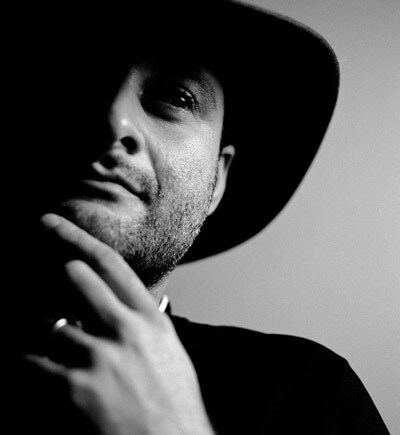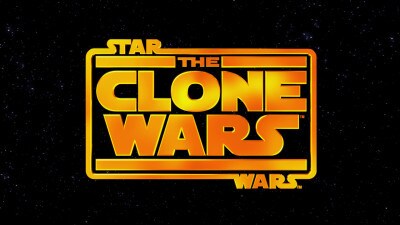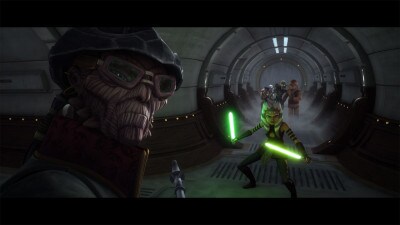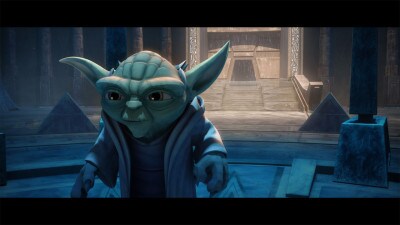StarWars.com concludes its discussion with the series' supervising director, talking bonus episodes and more.

In the final installment of StarWars.com's interview with Dave Filoni about Star Wars: The Clone Wars Season Five, available now on Blu-ray and DVD, the show's supervising director discusses a few details about those long-awaited bonus episodes, passing on what he has learned from George Lucas, and creating Star Wars Rebels -- with a little help from his friends. (In case you missed them, be sure to check out part one and part two of the interview.)
StarWars.com: When you made Season Five, you didn't really know it would be the end of the series, but the last arc still feels like a finale. How do you feel about it as an ending?
Dave Filoni: Well, I didn't know it would be the end of the series, per se, but I had a decent inkling that it would be the end of the show on Cartoon Network. You look at it realistically, the show had been on the air for five years at that point. That's a long time for an animated show that's not in prime time. So I thought, if this is the last season on Cartoon Network, then I want to have a proper ending for the people that have watched it.
That was the whole thing with Ahsoka, and giving that character some finality in that timeline. It was an important moment. I directed that as if it was this big goodbye, kind of knowingly that it might be a goodbye to at least the way Clone Wars was broadcast, if not the show itself. And I'm happy with that. I was very glad that it ended with Ahsoka, because it very much began with Ahsoka in the movie. Everyone pointed out from the beginning -- we know what happens to Anakin, we know what happens to Obi-Wan, and to Padmé. So where's the mystery and where's the suspense? Well, it turned out Clone Wars was largely about this girl, Ahsoka, who no one knew. And while every episode definitely was not about her, her thread shows you the way the Jedi are looked at in the war, how they're fighting the war, what they're questioning. So it was a proper way to go out.
StarWars.com: It also feels to me like you get closure to her story, but there's still some mystery left.
Dave Filoni: Oh, yeah. I don't know that you want a definite ending... I think a lot of people just want to know whether she lives or she dies. And most people don't feel like there's an ending unless she dies. I can see that point, but the fact is that that story can go on if you want it to, and we definitely had stories with her after that episode. That's no secret. It's an ending of one large phase for that character, which is, "What does it mean for me to be in the Clone War and what's my role in it?" And she chooses a different path than the Jedi do, or the Republic chooses. So she's now on this kind of third strand. She doesn't become a part of the Empire, though I don't think Ahsoka would consider herself a Jedi in the post-Republic era. We're not at that point yet. I don't want to reveal to the audience how far or how long her story goes on. Does it go past Order 66 or not? That's all been discussed in detail, I assure you. [Laughs]
What happens next with her, and when you see it, that's kind of the fun, I think. Fans can say, "Maybe we will get to see that." Just like when I was a kid, "Maybe I will get to see what Darth Vader was like when he was young," and then I did, finally. So I think that it's encouraging that some characters are still out there from Clone Wars. Characters like Rex, Wolffe, Hondo, Embo, they haven’t been forgotten, and we can still have stories told about them.
StarWars.com: You had a major role in creating and developing characters like Hondo and Ahsoka, and they get to live on -- they’re still out there in the Star Wars universe. That seems like an amazing thing to have contributed.
Dave Filoni: Yeah, it’s very weird. I don’t think of my role in the creation of the characters much, because the characters, they just seem like they were always there in the Star Wars universe and I was just lucky to be the one to relay their stories to the audience. I’m always excited when other creative people want to use those characters, and I’m always very thankful when they approach me about it, so that I can help them, and say, “Well, this is what we intended and these were our plans. I’d appreciate it if you would follow these ideas because these are things George Lucas and I worked out.” That’s still very important.
To add to Star Wars was a huge thrill. I don’t necessarily think of them as my characters per se, but I do feel some guardianship over them to make sure that some of the things that aren’t supposed to happen to them don’t happen. And that’s a responsibility more than an ownership, and it’s my task to inform people when things do need to happen or don’t need to happen, and you know, be a guide to other people coming on board just as George was a guide to me.
StarWars.com: So, there is more Clone Wars to come with the bonus episodes. I know you can't talk about some things, but what can you tell us about them?
Dave Filoni: The finished episodes were the ones that were already pretty far down the track in terms of production. They were very near completion.
When you look at level of importance to wrap things up for fans, I think that two story arcs that fans will get to see are really, really important for the overall Clone Wars story. So I’m very glad that fans will get to see them in their completed form.
It’s not like all of the bonus material that comes out was planned on really answering things for fans. It’s more, “This is where we were headed,” and the Yoda story arc [announced on Twitter] definitely gives a sense of closure. One of the story arcs, which is very short, is not essential to the overall story but it is a nice final showcase for one of the prequel characters.
The stories coming out definitely will cause a lot of debate and discussion among fans, which is what good Star Wars stories always do, and I look forward to talking about the stories with them when the time is right.
And when George and I get together, when I go have lunch with him, he and I still talk about [The Clone Wars]. We talk about things, and it’s just good to discuss because you never know with Star Wars. I never thought in my lifetime there would be a [Star Wars: Episode] VII, VIII, and IX, and here they come. So it’s just good to keep talking about these things and figure out as much about them as possible, because who knows. I could be a very old man and some kid that was raised on Clone Wars will want to continue the story, so I better know that story when they come for it.
StarWars.com: As a whole, now when you look back on The Clone Wars, what does it mean to you as a body of work that you played such a big part in?
Dave Filoni: It's strange. I look at Clone Wars... and I really enjoy watching it because I'm a Star Wars fan. Often times, I feel like, "How did I have anything to do with that?" To me they feel right.
I think that by the end we definitely were getting it right. We had a lot to learn in the beginning, and I think that we made certain mistakes that are unavoidable when you're a fan, that you do things that you've seen in the movies repeatedly, and you just want to capture that feeling so you're just repeating things more than innovating. And George warned us in the beginning. We didn't quite understand what he was talking about, and as we went along and became better at what we were doing, we understood the path of making these types of stories a lot better, and the method of how to make them a lot better. I'm immensely proud of that.
I can't separate the stories we told from the people that made them. It was a great experience, and I tried to make it a good experience for the crew working on it, because we were working very hard. For me personally, it was the greatest education in filmmaking I could ever get. The filmmaker I am today is dramatically different from where I started, and that's all because of George and his patience when teaching me, being a mentor, not getting frustrated when I wasn't really getting it right. Just taking the time to teach all of us how to do this the way that he did it, and at times, I hope, get close to that effervescent magic that is Star Wars. You know, to really make the jump into that world. So I owe George very much. Everything that I do going forward with my career, I think, will be a reflection of that knowledge that I gained from him. I take it seriously, that it’s part of a legacy. It's a privilege, and an incredibly lucky, lucky thing that I became a part of. The people that have luck know that a lot of hard work goes into getting yourself into the position to experience that luck. You know, a lot of different things had to come together for a lot of different people to make this show work.
The foundation of it all definitely was George Lucas and his belief in us as a group, and his willingness to teach us and guide us and let us make Star Wars, with him and then for him in the later years of Clone Wars. And I think that that, for him, was a rewarding experience, as well -- that he had a team of people on the ranch dedicated to making Star Wars the way that he wanted it. And I'm still dedicated to that today. To take the things he taught me and move forward with them. He would come to us with ideas, and we would sit down and hash them out, and then we would go to work making these stories. He left a lot of the critical decisions to me, but I always had to keep in mind what he was after, what he had taught me. That was awesome. You know, to tell these stories, and to take them to the screen, to have him come back to the theater one day and sit down and watch them. It was awesome and it was nerve-wracking and it was exciting.
StarWars.com: It strikes me that as you're working on Star Wars Rebels now, you're basically telling the first canonical Star Wars stories without input from George Lucas.
Dave Filoni: Oh, that's very challenging. It's a legacy thing that a lot of us take very seriously. It's not just about telling the stories; it's how the stories get made, it's the quality of the stories that we're telling. There's a certain feeling that Lucasfilm stories have that we need to maintain.
So there's a lot of responsibility, and yet it's exciting, too, when you work with new people from the outside. And that's a very important part of Star Wars, is to have new ideas, and new things come into it, and to be open to new ideas. It's where that meets that you get the real creativity in Star Wars, and I think it's meeting well. I'm excited by the people I'm working with now, and I'm excited by the results that we're getting on Rebels. We're moving very fast, but we have some really great stuff happening already. It's different from Clone Wars, and it should be. I know some fans just see Rebels as an extension of Clone Wars, but it's not. It's an entirely different thing with a different feeling and a different vibe.
It is a different time, but you know, when Revenge of the Sith ended and I woke up and found myself tasked with moving Star Wars forward in an animated form, I don't think anybody at Lucasfilm other than George understood what that meant, which was that that was going to be the main vehicle for Star Wars for practically the next decade. There were other things -- The Force Unleashed came along, The Old Republic came along, but a gaming experience and any kind of theatrical television experience is different. I don't mean that they're not good, it's just that it's different. And we were the ones that were working with George constantly to keep his stories going. So, you know, I've been in this position before. [Laughs] It's nothing new. If anything, I understand the daunting task that it is and how fans will react, the most.
Before, when I was fronting [The Clone Wars], I was largely the spokesperson. This'll be nice to have some flanking support with [executive producers] Simon [Kinberg] and Greg [Weisman].
StarWars.com: Right. There were four Beatles to share the spotlight.
Dave Filoni: [Laughs] Yeah. But it's fun, too. I'd like to think the fans appreciated my availability, my willingness to answer questions, and just discuss, if not debate with them, what they like and don't like. I really mean it -- when they don't like something, that's fine. I get it. They can always tell me, too. It's all part of it. George was well aware of that, and besides teaching me story, he taught me how to navigate the media that comes with Star Wars attention. That's just another part of my Jedi training.
It's gonna be an awesome experience, the future of Star Wars, and part of my responsibility is to be here for it. We'll see what happens.
StarWars.com: Well, that's about it. I just wanted to ask, what does it mean to you to be telling Star Wars stories?
Dave Filoni: It's still a tremendous privilege. It's never lost its luster, it's so fun. You know, especially with the times we're in now and Star Wars expanding everywhere, I think it's just incredible. It's an endless universe of storytelling. I've learned more than anybody, perhaps, that you can tell any kind of story with Star Wars. Any kind at all.

Dan Brooks is Lucasfilm's senior content writer, and spends his days writing stuff for and around StarWars.com. He loves Star Wars, ELO, and the New York Rangers, Jets, and Yankees. Follow him on Twitter @dan_brooks where he rants about all these things.



